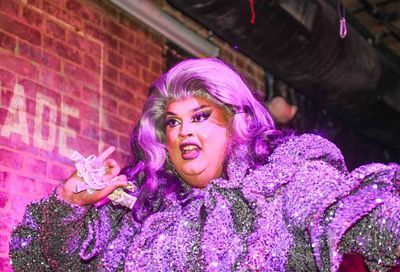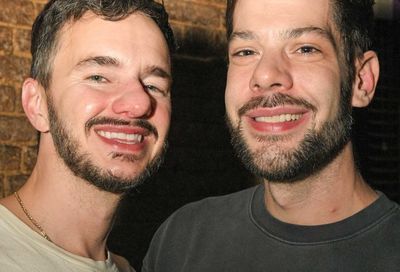Worth Fighting For
A Town Square Opinion
As the Capital Pride parade turns the corner of R Street and 17th, my friends and I stand on our chairs on the patio of Dupont Italian Kitchen and cheer the marchers on. Leading off the parade is the Gay and Lesbian Liaison Unit of the Metropolitan Police Department, running their sirens to cheers from the crowd. They are followed by more than a dozen local political candidates, as well as the gay marching band, gay-welcoming ministries, athletes preparing for the Gay Games, floats with bodybuilders and drag queens and two-stepping cowboys, and various groups marching behind their banners. As always, the biggest cheers are for the PFLAG parents.
I’m not sure whether it’s the arrival of June, the recent change in the political climate, or sheer resilience that makes the crowd’s disposition so sunny. Given how much harm the radical right has done to faith, flag and family in the very name of those things, those of us who have been their principal scapegoats would have ample reason to be angry. But I was more depressed than angry a few days earlier, as the U.S. Senate began the week by debating whether to write gay families out of the Constitution.
It wasn’t that the Marriage Prevention Amendment (as it ought to be called) had any chance of passage. I was thinking of my lover Patrick, whose permanent asylum application was recently denied by Belgium. If he loses his appeal, he faces deportation back to Africa. One of his uncles there attacked him with a knife four years ago, after learning that he was gay and was involved with me. Patrick fought back, and a few days later I helped him escape Africa. Unable to bring him here to the U.S., all I can do now is help pay his lawyer and hope that the weeks pass quickly until I can see him again.
The day before the Senate vote, civil rights leaders and anti-gay ministers held separate press conferences on the U.S. Senate grounds. Among those gathered by the Human Rights Campaign for the pro-gay event, in addition to the usual talking points, Sen. Edward Kennedy (D-Mass.) expressed pride in the human rights legacy of his state’s constitution, and in the Goodridge decision that continues it. Rep. John Lewis (D-Ga.) used words he has used many times, calling on his nation to be ”one people, one family, one house, the American house, the American family, the American nation.”
At the anti-gay rally earlier in the day, Bishop Harry Jackson of Bowie, Md., claimed that same-sex marriage would increase the number of black children without a mother and a father. He did not explain how this would happen. Speaking at the HRC rally, Rev. Nathan Harris of D.C.’s Lincoln Congregational Temple said, ”Heterosexual marriage has done a good job on its own of falling apart.”
I thanked Rep. Lewis after the HRC rally, and he expressed optimism about the coming election. Whenever I meet him, I marvel anew at the fortitude that enabled him to survive the Freedom Rides and Bloody Sunday four decades ago, and at the good fortune of gay Americans in having such a steadfast ally in this civil rights hero. In his quiet determination and grace I recognize qualities that impressed me about Patrick.
When our personal journeys include fighting for equality as gay people, they can bring estrangement from our families. For many of us, risking that estrangement was an essential part of asserting ourselves, of coming into our own. But a necessary step is not the same as the goal. However far we travel, we often feel the presence of our birth families as we form families of our own. The shared values endure after the fighting is over.
The same is true for us politically as we fight for legal protections that others take for granted, because the people we need to win over include members of our own families. As is illustrated by the ubiquitous story of the disastrous Thanksgiving dinner, sometimes our families can bring out the worst in us, and we find ourselves pouring salt on old wounds. When you have so much shared history with people, it can be hard to turn over a new page. Winning votes among this constituency is politics at its most retail.
Standing near my friends and me during the pride parade is a straight, black couple with a toddler of perhaps 18 months. The little boy jumps up and down and claps as he watches a colorful float go by, and there is no sign that his parents see this any differently than an old-fashioned Fourth of July parade. He has not learned to hate, and Mom and Dad show no sign of intending to teach him. In that child I glimpse our future.
Despite all that my Patrick has gone through with his family, and his strength and resolve in standing up for himself, he still feels strong family ties. He misses his brother terribly. Once when I was with him in Brussels, he learned of the death of a family member. I could feel his anguish at not being able to be there. We decided to send money to help with the funeral expenses, a customary obligation. Prior to that, I was merely Patrick’s lover. With that simple act, for the first time, and whether they liked it or not, I was family.
Richard J. Rosendall is a writer and activist whose work has appeared on Salon.com and the Independent Gay Forum . He can be reached at rrosendall@starpower.net.
Support Metro Weekly’s Journalism
These are challenging times for news organizations. And yet it’s crucial we stay active and provide vital resources and information to both our local readers and the world. So won’t you please take a moment and consider supporting Metro Weekly with a membership? For as little as $5 a month, you can help ensure Metro Weekly magazine and MetroWeekly.com remain free, viable resources as we provide the best, most diverse, culturally-resonant LGBTQ coverage in both the D.C. region and around the world. Memberships come with exclusive perks and discounts, your own personal digital delivery of each week’s magazine (and an archive), access to our Member's Lounge when it launches this fall, and exclusive members-only items like Metro Weekly Membership Mugs and Tote Bags! Check out all our membership levels here and please join us today!
























